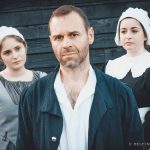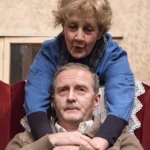
Harold participated in 1 production at the Barn.
Harry died peacefully on February 6th, aged 91. In recent years a regular supporter of productions and a member of the Front of House team, he was an unassuming, and, for many of our newer members, probably unknown figure at the Barn. Yet his contribution to the development, history and traditions of our Club is immeasurable.
As one of the older members of the editorial team of Barn News I am usually asked to compile the obituaries when members pass on. To do this I use the information in the two volumes of the history of the Welwyn Drama Club from 1934 to 1969, compiled by Harry, and the four volumes of the History of the Barn Theatre Club, 1969 to 1989, also Harry’s work. These comprise a detailed narrative of Club events and personalities, and a full list of all productions and those who were involved in them. (Since 1989 the following volumes, 5, 6 and 7, have been the work of Robert Gill.)
When reading these tomes, one is in awe at the effort and research Harry put into them. Each season’s play lists are preceded by a commentary on the season’s events. Finely detailed, perceptive, critical where he felt the need, and generously ensuring that all those involved in any aspect he was reporting were credited by name, these works represent the Club’s history.
Harry’s first mention of himself in the records is in the 1958 Drama Club production of Present Laughter. From 1958 to 1967 he was the editor of Drama News, the Drama Club’s magazine. In the following years he acted in eight of their productions (they did two each year) including Eric Farlie’s Romanoff and Juliet (1959) and Louis Davis’s Irregular Verb to Love (1964). His late wife, Alice, who appeared only rarely in Barn productions, prompted when Harry appeared in Roar Like a Dove in 1961.
My first effort at the Barn was in the Drama Club’s Wrong Side of the Park, fifty years ago this year, and Harry was in the cast. His immediate friendship was warm, undemanding and lasting. He was the Barn Theatre Club’s Production photographer and his friends were used to receiving calendars at Christmas depicting their dramatic efforts from his collection of photos. When Shirley and I celebrated our Silver Wedding, he sent us a card large enough to hold many pictures of our whole family’s involvement at the Barn, and this is framed on my office wall.
His comments in the history of the Club’s operations were, of course, published well after the events, but Harry would comment on current aspects of the Club’s business by letters to the Chairman, or to the Barn News. I received several of these admonitions, always impeccably polite and beautifully worded but leaving me in no doubt what he thought would have been the proper course of action. These missives were not the ramblings of a grumpy member, but were born of his pride and respect for the dignity of the Club. In the history volumes all aspects of the Barn were recorded, from choice of plays, to rebuilding plans, to dealings with the local authority, to the style of the Barn News, the shortcomings of Council, ticket prices, youth groups, relationships with other societies, power cuts, central heating, and the AGM.
Some examples. In 1970, as the new Club began to find its feet, he referred to a letter in Barn News warning against the dangers of complacency in our standards –
“the Club needed to make up its mind if it was a Social Club with an interest in drama or a serious Drama Society with social adjuncts”.
The following year, with a touch of the undoubted sense of humour with which he could ease his criticism –
“One of the lady members of Council spoke with unexpected authority about the state of the gentleman’s toilet”.
In 1974 –
“What was described as ‘a superior grade of coffee’ was offered in the interval –the price was raised to 3p per cup”.
In 1977 he wrote about the coffee serving arrangements, and words such as shambles, scrum, totally inadequate, makeshift and dangerous had been heard. In 1976 there was an
“attempt by Council to satisfy those cynics among the membership who professed a belief that the plays staged at the Barn were chosen by some peculiar rite involving the study of bats’ entrails by midsummer moonlight”.
When Harold Jenning’s guide dog, Ivor, died in 1981, Harry wrote:
“a well-regarded canine figure who was virtually an honorary Club member! Ivor is affectionately remembered for a well-timed snort, made during one of the speeches at the AGM, which admirably ex- pressed the general feeling of the meeting at that particular moment”.
More seriously, with regard for the dignity and reputation of the Club, Harry commented on situations which arose regarding the correct (and incorrect) way to respond to criticism of our artistic efforts, and the pitfalls of altering published scripts. In addition, he completed a history of the Welwyn Drama Festival.
A gentle and very erudite man, quick to compliment those whose efforts he admired, and not embarrassed to make his opinions known in the right quarter when he felt the Club or particular members were ‘letting the side down’, Harry’s work on the history and reputation of the Club is magnificent. Those of us who have regular access to it as part of our work (Denys and Marion Wells, Archivists, Heather Gill and Denise Duffy, Photo and Programme Archivists, Robert Gill who continues Harry’s work, and the Editorial team of Barn News) will never cease to be grateful.
Most of the eighty years of the Barn’s existence as a theatre has been brilliantly recorded by Harry. His modesty is revealed by the single entry he gives himself in the last volumes of his work – when he retired from Production Photography in 1984 after twenty-five years in the post.
He signed off his last volume with the epithet
“If a farmer fills his barn with grain, he gets mice. If he leaves it empty he gets actors”.
We offer our condolences to his family and friends, and are eternally grateful for his inspiring work.
You may UNSUBSCRIBE at ANY time via the link contained in every email we send out.




© 1960 - 2024 Barn Theatre Trust Limited, Barn Close, Welwyn Garden City, Hertfordshire AL8 6ST
Company Limited by Guarantee, Registered in London, No. 1604619 | Registered charity No. 284143
Privacy & Cookie Policy | Website designed, hosted and maintained by ZIC Media Limited
Do you have a question? Do you need help?
Feel free to contact us and we’ll be more than happy to answer your questions.
If you need to contact a specific department eg. Box Office, please select it from the dropdown list.
Part 1, 18th Jan 8pm
Part 2, 19th Jan 8pm
Parts 1+2 20th Jan 2.30pm
Part 1, 23rd Jan 8pm
Part 2, 24th Jan 8pm
Part 1, 25th Jan 8pm
Part 2, 26th Jan 8pm
Part 1, 27th Jan 2.30pm
Part 2, 27th Jan 8pm